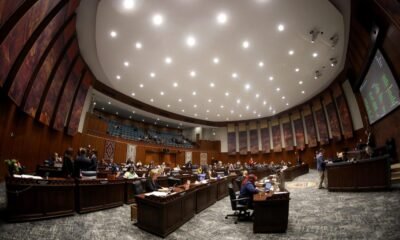California Department of Justice
Trump Administration Faces Backlash Over Controversial Transportation Funding and Immigration Ties

A federal judge in Rhode Island is poised to block a controversial directive from the U.S. Department of Transportation, which threatens to cut billions in funding for state transportation projects unless Democrat-led states comply with federal immigration enforcement. The case centers around the authority of federal agencies to impose such conditions on congressionally approved funding.
U.S. District Judge John James McConnell Jr. expressed skepticism during a recent hearing, questioning the constitutional basis for the Transportation Department’s actions. “That’s how the Constitution works,” he remarked, highlighting that federal agencies derive their appropriations power from Congress.
The lawsuit, initiated by 20 Democratic state attorneys general, contests an April directive from Transportation Secretary Sean Duffy, compelling states to cooperate with federal immigration enforcement to access approved federal grants. Delbert Tran, representing the states, criticized this as an attempt to “hold hostage” vital transportation funding, undermining state sovereignty.
In defense of the directive, acting U.S. Attorney Sara Miron Bloom argued it merely asks states to adhere to federal immigration laws. She claimed that withholding funding is justified when such adherence is not met, as it purportedly enhances the safety and security of transportation systems.
Judge McConnell, appointed by former President Barack Obama, noted a discrepancy between the Trump administration’s portrayal of the directive and its legal implications. He observed that federal anti-sanctuary city rhetoric has framed states that do not comply as targets.
With potential ramifications affecting countless projects, McConnell intends to issue a decision on a preliminary injunction before Friday. This ruling, however, would be specific to the states involved in the lawsuit, rather than affecting all jurisdictions nationwide.
The states participating in the lawsuit include California, Illinois, New Jersey, Rhode Island, Maryland, Colorado, Connecticut, Delaware, Hawaii, Maine, Massachusetts, Michigan, Minnesota, Nevada, New Mexico, New York, Oregon, Vermont, Washington, and Wisconsin.
Tran argued that the Transportation Department’s directive undermines legislative authority established by Congress, which appropriated over $100 billion for transportation projects. He warned that halting funding would have catastrophic effects, potentially leading to increased accidents and fatalities on roads and other transportation modes.
Bloom defended the administration’s stance, insisting that the directive is aligned with maintaining the safety of transportation systems. However, Judge McConnell raised concerns about the broader implications of allowing the secretary to impose conditions relating to issues outside transportation, such as abortion laws.
Tran emphasized that requiring states to enforce immigration laws as a condition for funding is outside federal statutory authority. He maintained that this approach stretches the limits of what the department can legitimately demand.


















